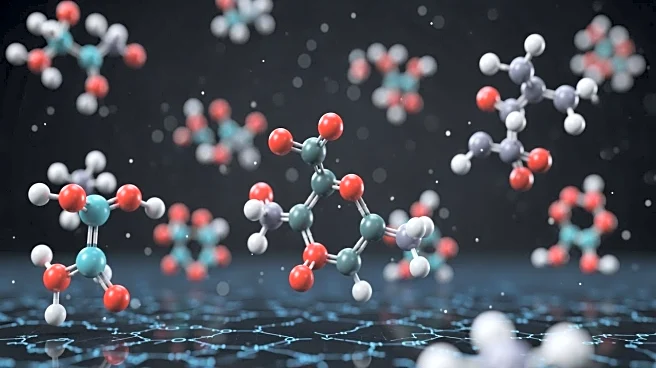What's Happening?
The BioRGroup dataset has been introduced to expand ChEBI molecules referenced in the Rhea database, addressing challenges in cheminformatics posed by generic chemical structures. These structures, defined
using R-groups, are placeholders for unspecified molecular fragments, which complicate the use of cheminformatics tools and AI models. The dataset systematically converts these generic entries into fully defined molecular instances, enhancing their utility in computational analyses. The process involves using the Rhea database as a source for biologically relevant molecules, annotated with ChEBI identifiers. An enumeration pipeline developed with RDKit and PubChem data identifies viable substitutions for R-groups, incorporating stereochemistry to generate comprehensive molecular sets. This approach aims to bridge the gap between abstract chemical representations and usable molecular instances, facilitating the validation of cheminformatics tools and AI model training.
Why It's Important?
The introduction of the BioRGroup dataset is significant for the field of cheminformatics, as it addresses the limitations posed by generic chemical structures in databases like ChEBI. By expanding these structures into fully defined molecular instances, the dataset enhances the accuracy and scope of computational analyses. This development is crucial for AI-driven research, as it allows for more precise model training and validation, potentially leading to breakthroughs in drug discovery and biocatalysis. The dataset's ability to integrate generic ChEBI molecules into cheminformatics workflows without exclusion due to undefined nature represents a substantial advancement, offering researchers a more comprehensive resource for scientific exploration.
What's Next?
The BioRGroup dataset is expected to facilitate further research and development in cheminformatics and AI applications. Researchers may explore new methodologies for handling generic chemical structures, potentially leading to improved data curation techniques. The dataset's integration into existing workflows could prompt updates to cheminformatics tools and models, enhancing their predictive capabilities. Additionally, the dataset may inspire similar initiatives to address other challenges in chemical data representation, fostering innovation in the field.
Beyond the Headlines
The expansion of ChEBI molecules through the BioRGroup dataset highlights the importance of data curation in scientific research. It underscores the need for high-quality, structured data to support AI-driven discoveries, emphasizing the role of manual curation in maintaining data integrity. This development also raises ethical considerations regarding data accessibility and the potential for AI models to influence scientific outcomes. As AI continues to reshape scientific fields, the balance between automated processes and human oversight remains a critical discussion point.








